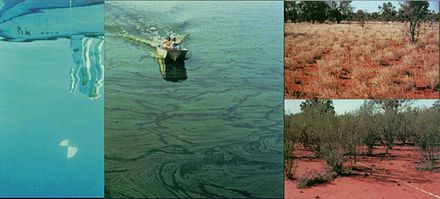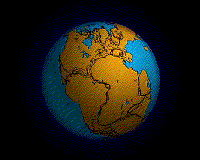Portal:Ecology
| |
|
|
Ecology
|
|
Ecology (from Ancient Greek οἶκος (oîkos) 'house', and -λογία (-logía) 'study of') is the natural science of the relationships among living organisms, including humans, and their physical environment. Ecology considers organisms at the individual, population, community, ecosystem, and biosphere levels. Ecology overlaps with the closely related sciences of biogeography, evolutionary biology, genetics, ethology, and natural history. Ecology is a branch of biology, and is the study of abundance, biomass, and distribution of organisms in the context of the environment. It encompasses life processes, interactions, and adaptations; movement of materials and energy through living communities; successional development of ecosystems; cooperation, competition, and predation within and between species; and patterns of biodiversity and its effect on ecosystem processes. Ecology has practical applications in conservation biology, wetland management, natural resource management (agroecology, agriculture, forestry, agroforestry, fisheries, mining, tourism), urban planning (urban ecology), community health, economics, basic and applied science, and human social interaction (human ecology). The word ecology (German: Ökologie) was coined in 1866 by the German scientist Ernst Haeckel. The science of ecology as we know it today began with a group of American botanists in the 1890s. Evolutionary concepts relating to adaptation and natural selection are cornerstones of modern ecological theory. Ecosystems are dynamically interacting systems of organisms, the communities they make up, and the non-living (abiotic) components of their environment. Ecosystem processes, such as primary production, nutrient cycling, and niche construction, regulate the flux of energy and matter through an environment. Ecosystems have biophysical feedback mechanisms that moderate processes acting on living (biotic) and abiotic components of the planet. Ecosystems sustain life-supporting functions and provide ecosystem services like biomass production (food, fuel, fiber, and medicine), the regulation of climate, global biogeochemical cycles, water filtration, soil formation, erosion control, flood protection, and many other natural features of scientific, historical, economic, or intrinsic value. (Full article...) Selected article - Lake and Mulga ecosystems with alternative stable states In ecology, resilience is the capacity of an ecosystem to respond to a perturbation or disturbance by resisting damage and subsequently recovering. Such perturbations and disturbances can include stochastic events such as fires, flooding, windstorms, insect population explosions, and human activities such as deforestation, fracking of the ground for oil extraction, pesticide sprayed in soil, and the introduction of exotic plant or animal species. Disturbances of sufficient magnitude or duration can profoundly affect an ecosystem and may force an ecosystem to reach a threshold beyond which a different regime of processes and structures predominates. When such thresholds are associated with a critical or bifurcation point, these regime shifts may also be referred to as critical transitions. Human activities that adversely affect ecological resilience such as reduction of biodiversity, exploitation of natural resources, pollution, land use, and anthropogenic climate change are increasingly causing regime shifts in ecosystems, often to less desirable and degraded conditions. Interdisciplinary discourse on resilience now includes consideration of the interactions of humans and ecosystems via socio-ecological systems, and the need for shift from the maximum sustainable yield paradigm to environmental resource management and ecosystem management, which aim to build ecological resilience through "resilience analysis, adaptive resource management, and adaptive governance". Ecological resilience has inspired other fields and continues to challenge the way they interpret resilience, e.g. supply chain resilience. (Full article...)Selected image -An animation of the Earth's hypothesized Pangaea separation. Pangaea is hypothesized as a supercontinent that existed during the Paleozoic and Mesozoic eras about 250 million years ago, before the component continents were separated into their current configuration.
General imagesThe following are images from various ecology-related articles on Wikipedia.
Related WikiProjectsThings you can do
Entries here consist of Good and Featured articles, which meet a core set of high editorial standards.
 In conservation biology, a flagship species is a species chosen to raise support for biodiversity conservation in a given place or social context. Definitions have varied, but they have tended to focus on the strategic goals and the socio-economic nature of the concept, to support the marketing of a conservation effort. The species need to be popular, to work as symbols or icons, and to stimulate people to provide money or support. Species selected since the idea was developed in 1980s include widely recognised and charismatic species like the black rhinoceros, the Bengal tiger, and the Asian elephant. Some species such as the Chesapeake blue crab and the Pemba flying fox, the former of which is locally significant to Northern America, have suited a cultural and social context. (Full article...)Selected biography -Lian Pin Koh (born 1976 in Singapore) is a Singaporean conservation scientist. He is Associate Vice President and Chief Sustainability Scientist at the National University of Singapore (NUS), where he oversees and champions sustainability-related research. He employs a whole-of-University strategy to bridge academia with policy makers, industry and civil society, driving the change needed across all sectors to tackle the twin planetary crises of climate change and biodiversity loss. By initiating and spearheading engagements with stakeholders locally and at international fora, Prof Koh seeks to promote societal understanding of the world we live in, and amplify the university’s and Singapore’s contributions to sustainability efforts globally. (Full article...)Did you know (auto-generated)
Selected quote -
Ecology news
Additional News Highlights
Selected publication -AMBIO: A Journal of the Human Environment is a multidisciplinary English language academic journal published by the Royal Swedish Academy of Sciences since 1972. It is published eight times a year. The journal is described as "a journal of the human environment", covering ecology, environmental economics, geology, geochemistry, geophysics, paleontology, hydrology, water resources, oceanography, earth sciences, meteorology, physical geography and other subjects. (Full article...) Related portalsMore did you know -Related articlesAssociated WikimediaThe following Wikimedia Foundation sister projects provide more on this subject:
Web resources
Discover Wikipedia using portals |

















































